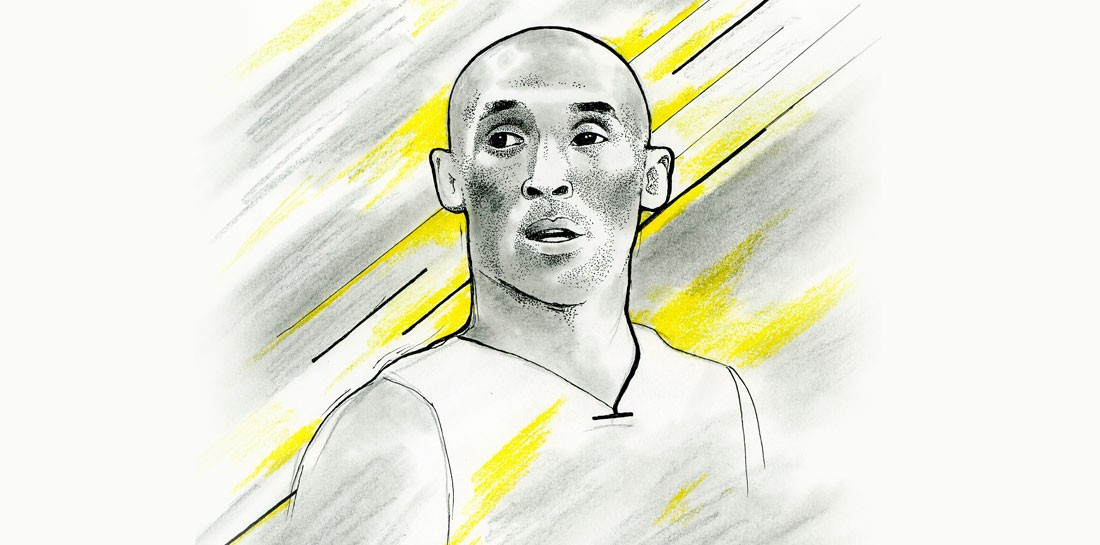Far from a slam dunk
The complexities of memorializing a basketball legend and accused rapist
In the weeks since former NBA star Kobe Bryant’s untimely death in a helicopter crash, it’s been nearly impossible to browse the internet without seeing tributes to the 41-year-old basketball legend.
The Grammy Awards – held hours after Bryant’s death in the Staples Center, where he spent his entire professional career playing for the Los Angeles Lakers – kept a spotlight on Bryant’s two retired jerseys up in the rafters. Murals sporting Bryant’s image quickly popped up around the United States and in the Philippines, and mourning fans left thousands of tributes at a makeshift memorial.
News coverage in the wake of Jan. 26’s helicopter crash extols Bryant’s 20-year NBA career, during which he won five championships and once netted 81 points in a single game. However, many of these articles barely mention the eight other passengers who died that morning, let alone some of the horrific parts of Bryant’s legacy.
For the record, the other victims include Bryant’s 13-year-old daughter, Gianna, as well as Payton and Sarah Chester; Alyssa, Keri and John Altobelli; Christina Mauser and Ara Zobayan.
Evette Dionne writes in TIME Ideas that, upon hearing of Bryant’s death, she immediately thought about all the times her brother would shout “Kobe!” while throwing “makeshift paper basketballs into a trash can.”
“I thought about Bryant’s widow, Vanessa, and their fatherless daughters who now have to move through life with a hovering cloud of grief,” she writes. “I thought about the many black children and families who saw Bryant as a possibility model. And I thought about the woman who accused Bryant of rape having to watch her perpetrator being valorized for eternity.”
In 2003, Bryant was charged with sexually assaulting a 19-year-old. She was scrutinized and intimidated for months before prosecutors dropped the case, which was settled for an undisclosed amount.
However, Bryant’s name and legacy don’t carry the weight of his alleged crime. They should. Reporters, producers and editors do the public a disservice by focusing almost solely on Bryant’s illustrious basketball career in their coverage.
It can be traumatizing for victims of sexual assault to see an accused rapist lauded as a hero, especially when these tributes inundate social media, news alerts and general conversations. As Vox reporter Anna North writes, deaths like Bryant’s are complicated and beg this question: “How should the media and the public consider the legacy of someone who meant so much to so many, and yet was also accused of great harm?”
Journalists have the power to shape narratives surrounding public figures, and they often must tread carefully when it comes to reporting on beloved icons. There’s no denying that Michael Jackson was one of the most influential entertainers for decades. He was also repeatedly accused of sexually assaulting children.
In the years since Jackson’s death in 2009, conversations surrounding sexual crimes have drastically changed. And, as Dionne writes, “The #MeToo movement has helped equip us with more nuanced understanding of sexual violence. A person can be good to their spouses and their children, donate lots of money and create indelible work that influences – and can also be a monster.”
People need to be just as free to discuss Bryant’s terrible actions as his numerous records and accolades. Washington Post politics reporter Felicia Sonmez was suspended after she tweeted about the sexual assault case shortly after Bryant’s death. She posted a link to a 2016 Daily Beast article titled “Kobe Bryant’s Disturbing Rape Case: The DNA Evidence, the Accuser’s Story, and the Half-Confession,” which she did not write.
The tweet received backlash, including abusive comments and death threats, and Sonmez responded “Any public figure is worth remembering in their totality even if that public figure is beloved and that totality unsettling.”
As The New York Times states in Bryant’s obituary, his is a “complicated legacy.” I just wish they devoted a few more paragraphs to divulging all that means.
Danielle Doiron is a writer, editor and marketer based in Winnipeg. She can’t eat wheat right now, so if you have any killer gluten-free recipes, send ’em over.
Published in Volume 74, Number 18 of The Uniter (February 13, 2020)







